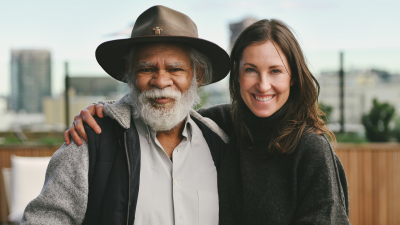Have we come far enough since the nation stopped to recognise a formal apology to Aboriginal and Torres Strait Islander Peoples?

Image: A mother and two children smile at the camera. It is a close-up photo of their faces.
Aboriginal and Torres Strait Islander visitors are advised this article includes content that some people may find difficult. A list of support resources is available at the end of this article.
It has been 16 years since the formal apology to Aboriginal and Torres Strait Islander Peoples was issued by former Prime Minister Kevin Rudd in 2008. The apology finally acknowledged cumulative years of injustices of Government policies and practices that forcibly removed Aboriginal and Torres Strait Islander children from their families – ultimately severing ties to kin, country and culture.
But how far have we come?
Last week, on 7 February 2024, The Productivity Commission’s first review of the National Agreement on Close the Gap was released, and the report is dire. The report confirms that despite substantial investment, Australian Governments need to radically and urgently change their approach if we are to try to have an impact on generations now and in the future. There are many recommendations listed, including overhauling Government systems and responses so that solutions are led by First Nations people.
For First Nations children, the situation is particularly critical. 43% of all children in care are First Nations children and are 11.5 times more likely to be placed in care than non-Indigenous children. First Nations children are vastly over-represented in the criminal justice system and face a poor trajectory in wellbeing, unemployment and disconnection to identity and opportunity.
Federal Government announces a dedicated National Aboriginal and Torres Strait Islander Children's Commissioner
Today’s historic announcement is a welcome advancement in changing the outcome for generations of First Nations children. This role has been advocated for by SNAICC – the National Voice for our Children (SNAICC) the peak body for First Nations children and recommended in the Family Matters Report year after year. Life Without Barriers has joined advocacy efforts with SNAICC for the establishment of a dedicated Commissioner for the past few years.
Why this role is so important?
A dedicated National Commissioner will be entirely focused on the rights and interests of Aboriginal and Torres Strait Islander children.
It provides Aboriginal and Torres Strait Islander leadership and design in solutions.
It will have powers enshrined in legislation and enable the Commissioner to make recommendations to policies, systems and funding for Aboriginal and Torres Strait Islander children.
The role is expected to work in partnership with state-based Commissioners, particularly dedicated state Aboriginal and Torres Strait Islander Commissioners to amplify the rights of children in states and nationally.
Some of the really big issues First Nations children face are expected to be the major agenda for the commissioner – for example, over-representation in child removals in out-of-home care, over-representation in the criminal justice system and the early intervention supports that are needed to support children to grow in culture and community.
Read the Life Without Barriers media release here.
What does SNAICC say?
For many years, SNAICC have signalled the alarm on unprecedented rates of child removal.
SNAICC says the Family Matters Steering Committee and mechanisms such as Safe and Supported: the National Framework for Protecting Australia’s Children, has offered a ground-breaking commitment to shared decision-making, and have helped lead to the establishment of the national Commissioner role.
“Our communities have continued to grow, innovate and thrive despite the ongoing impacts of systemic racism – we know the solutions that work best to deliver strengths-based, community-driven initiatives, which empower localised processes and cultural understandings to support the holistic wellbeing of our children and families.” SNAICC.
Read SNAICC's media release here.
Life Without Barriers' Commitment to children, young people and families
A key priority for Life Without Barriers is our national partnership agreement with SNAICC to reduce the over-representation of Aboriginal and Torres Strait Islander children in out-of-home care.
The commitment includes Life Without Barriers progressively stepping away from the provision of out-of-home care services to Aboriginal and Torres Strait Islander children and families. It also means supporting and advocating for direct investment in Aboriginal and Torres Strait Islander community-controlled organisations and lobbying the Government and the sector to work together to reduce the entry of First Nations children and families into the child protection system.
If you or anyone you know needs help
Know that it’s okay to reach out for support.
Aboriginal & Torres Strait Islander crisis support line 13YARN on 13 92 76
AIMhi-Y: An app to support the well-being of First Nations young people, aged 12-25
Brother to brother 24-hour crisis line on 1800 435 799
eSafety Commission's First Nations resources
Headspace on 1800 650 890
Suicide Call Back Service on 1300 659 467
The National Indigenous Postvention Service – After Suicide Support 24/7 1800 805 801
If you’re in an emergency situation or need immediate assistance call 000.


